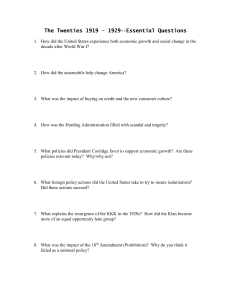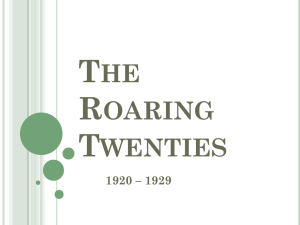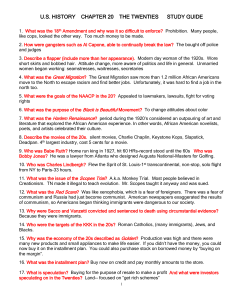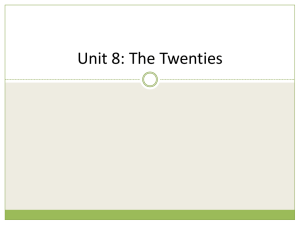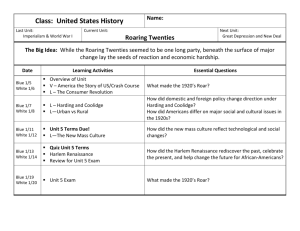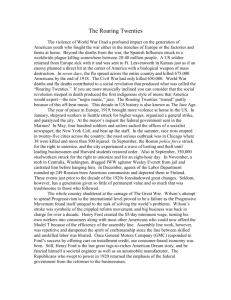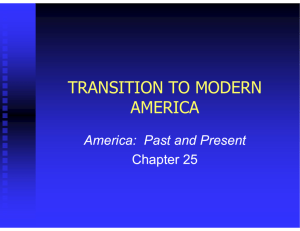The Roaring Twenties
advertisement
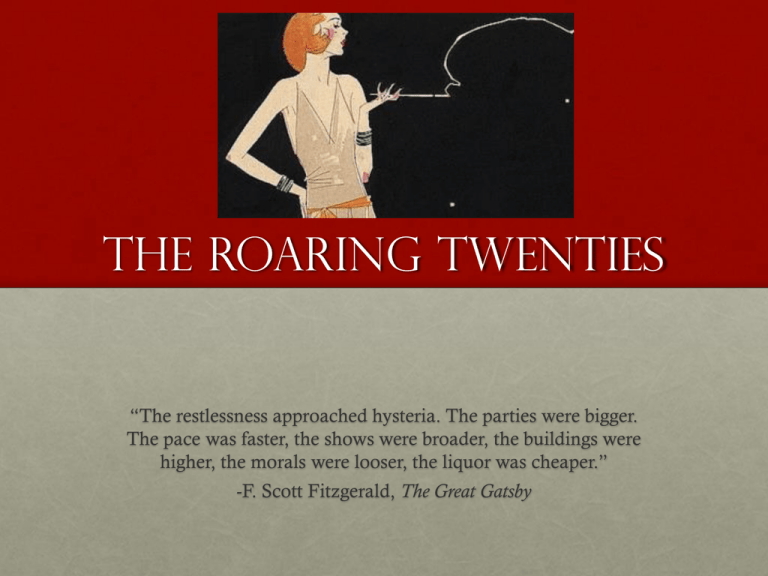
The Roaring Twenties “The restlessness approached hysteria. The parties were bigger. The pace was faster, the shows were broader, the buildings were higher, the morals were looser, the liquor was cheaper.” -F. Scott Fitzgerald, The Great Gatsby A Booming Economy • Factories more productive • Henry Ford, automobile industry • Brought mass production to new heights • Put cars on moving assembly lines • Manufacture time went from 12 hours to 90 minutes • Made Model T more affordable • Ford also increased wages, gave weekends off, shorter work days Automobile Changes America • Stimulated growth in relevant industries • Road construction boomed • U.S. highway system • Helped establish service stations, diners, motels, etc. • Altered residential patterns • Move farther away from city/work • Family road trips Consumer Revolution • New, affordable goods become available to the public • Advertising agencies hired psychologists to help appeal to the desires of the consumer • Buy on credit or installment payments • More Americans put money in stocks • Bull market: period of rising stock prices • Many ignore financial risks Cities, Suburbs, and THE Country • Immigrants, farmers, minorities head to cities • Skyscraper technology; cities built “up” • Mass transportation/cars = growth of suburbs • Drained cities of many upper- and middle-class residents • Farming income declined • Did not participate in/couldn’t afford consumerism • Growing debt, falling farm prices Politics of the twenties • Warren Harding and Calvin Coolidge • Return to normalcy, conservatism, support business • Harding’s Administration • Raise protective tariff, encourage American producers • European response? • Reduce government regulation on business • Laissez-faire: absence of government control over private business • Spending reduced from $18 bil to $3 bil POLITICS OF THE TWENTIES • Harding: nice guy, not too bright • Trusted others to make decisions • Ohio Gang: close friends of Harding • Ex: practiced graft, accepted money from criminals • Teapot Dome Scandal • Sec. of the Interior Albert Fall arranged to transfer oil reserves from Navy to Interior Dept. • Leased properties to private oilmen for bribes • Harding died before scandal was made public • Tarnished his legacy, burden inherited by Coolidge POLITICS IN THE TWENTIES • Calvin “Silent Cal” Coolidge • “The chief business of the American people is business” • To add to your notes: Chapter 20, Section 3 , Questions 1-4 (pg. 633) #5: Look at this political cartoon. What does it criticize about Coolidge’s presidency? How can you tell? Social and Cultural Tensions • Americans split between urban/rural • Urban: consumerism, leisure, open to social change and science • Education: mental ability, high levels of math and language • Modernism: prefer science/secular values over religious ideas • Rural: traditional view of science/religion, no consumerism/leisure • Education: three “Rs”: “readin’, ‘ritin’, ‘rithmetic” • Need to focus on farm work Religion • Many Christians thought Christianity was under attack • Fundamentalists: those who reaffirm the basic truths of their religion; Bible = literal truth • Scopes Trial: Tennessee passed law making it illegal to teach evolution • John Scopes arrested for teaching it in his class • Lawyers Clarence Darrow vs. William Jennings Bryan • Scopes found guilty: pay $100 fine Immigration • Nativists: people who were antiimmigrant • Said immigrants took jobs and threatened American cultural traditions • Red Scare added to nativists’ argument • Fear of the spread of communism, socialism • Quota systems, literacy tests, exclusion for many Asians • Rise in Mexican immigrants • Major contributions but still discriminated Crime • Revival of the Ku Klux Klan in rural America • Targeted minorities and immigrants • At its height: 4-5 million members • Boycotted businesses, terrorized citizens • Prohibition: passed in 1919 • Pros: improved individuals, families, societies; less alcohol-related disease • Cons: did not deter drinking, increased crime • Homemade alcohol smuggled by bootleggers • Organized crime to meet demand for alcohol • Al Capone: gangster who also took part in prostitution, drugs, robbery, murder • Repeal in 1933 A New Mass Culture • Changing technology and economy allowed for more leisure time • Motion pictures provide new form of entertainment • Silent movies: cheaper to attend, don’t need to know English • Stars like Charlie Chaplin • Eventually movies with synchronized sound (“talkies”) • Radio and phonograph became popular • Spread music, radio broadcasts, news reports across the country A new mass culture • Newspapers and radios helped boost popularity of sports • Athletes portrayed as celebrities, idolized • Charles Lindbergh: first to fly across the Atlantic solo and nonstop • “New Woman”: more liberated, more equal than before • Flapper image: short skirts, makeup, hairdo, free spirit • Newly won suffrage • New jobs: sales, management, public office • Women lived longer, married later, fewer children • New technology helps with caring for household Art and literature • War changed literature/art in America: pessimism, skepticism • Reproduce real life, highlight abstract styles • 1920s writers = “Lost Generation” • Fitzgerald, Hemingway, Eliot • Explore reality of American dream • Harlem Renaissance: African-American cultural expression • Jazz Age: highly improvised indigenous American music • Began in South, became popular worldwide • Demonstrate richness of African-American culture • “New Negro”: artists/writers present pains and joys of black identity in America
